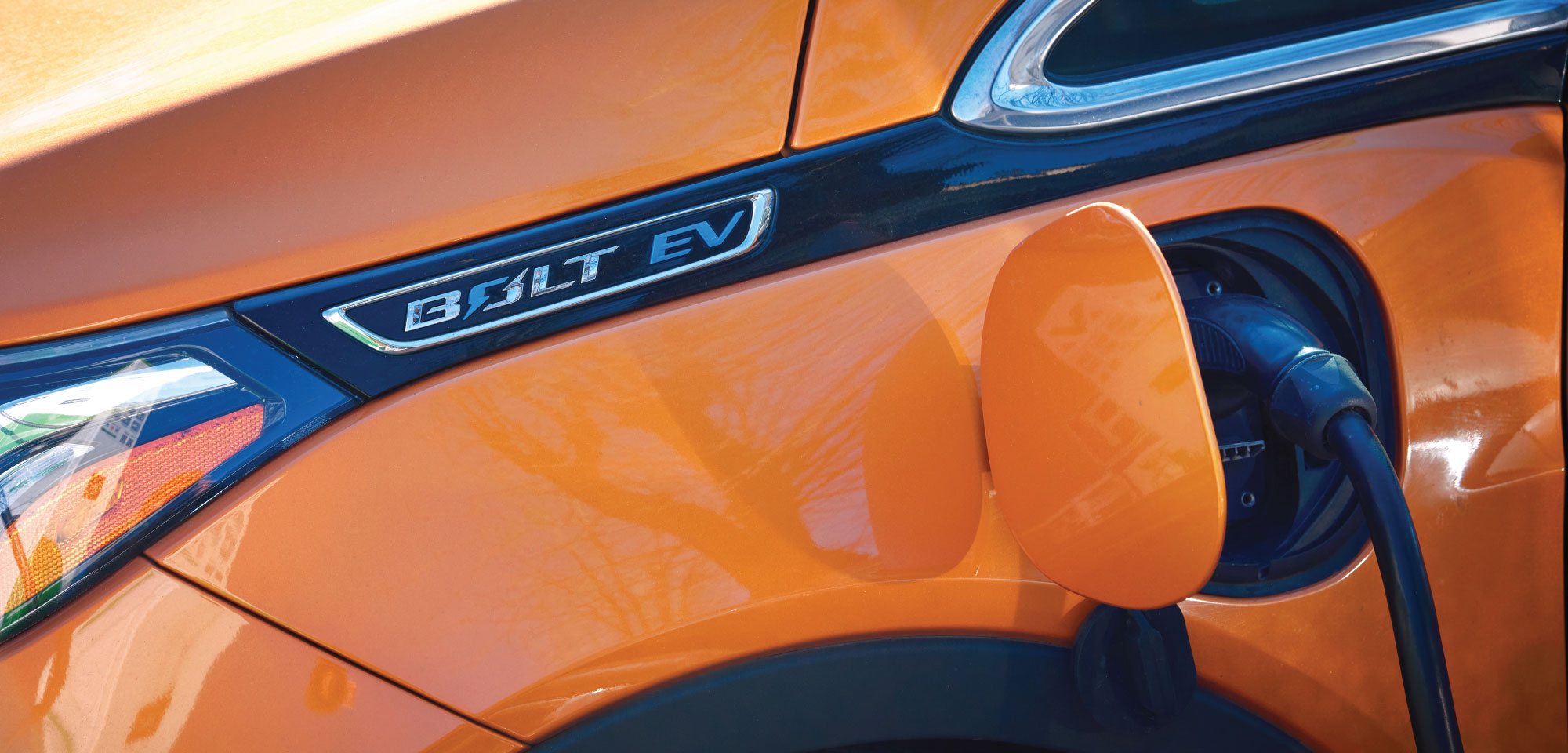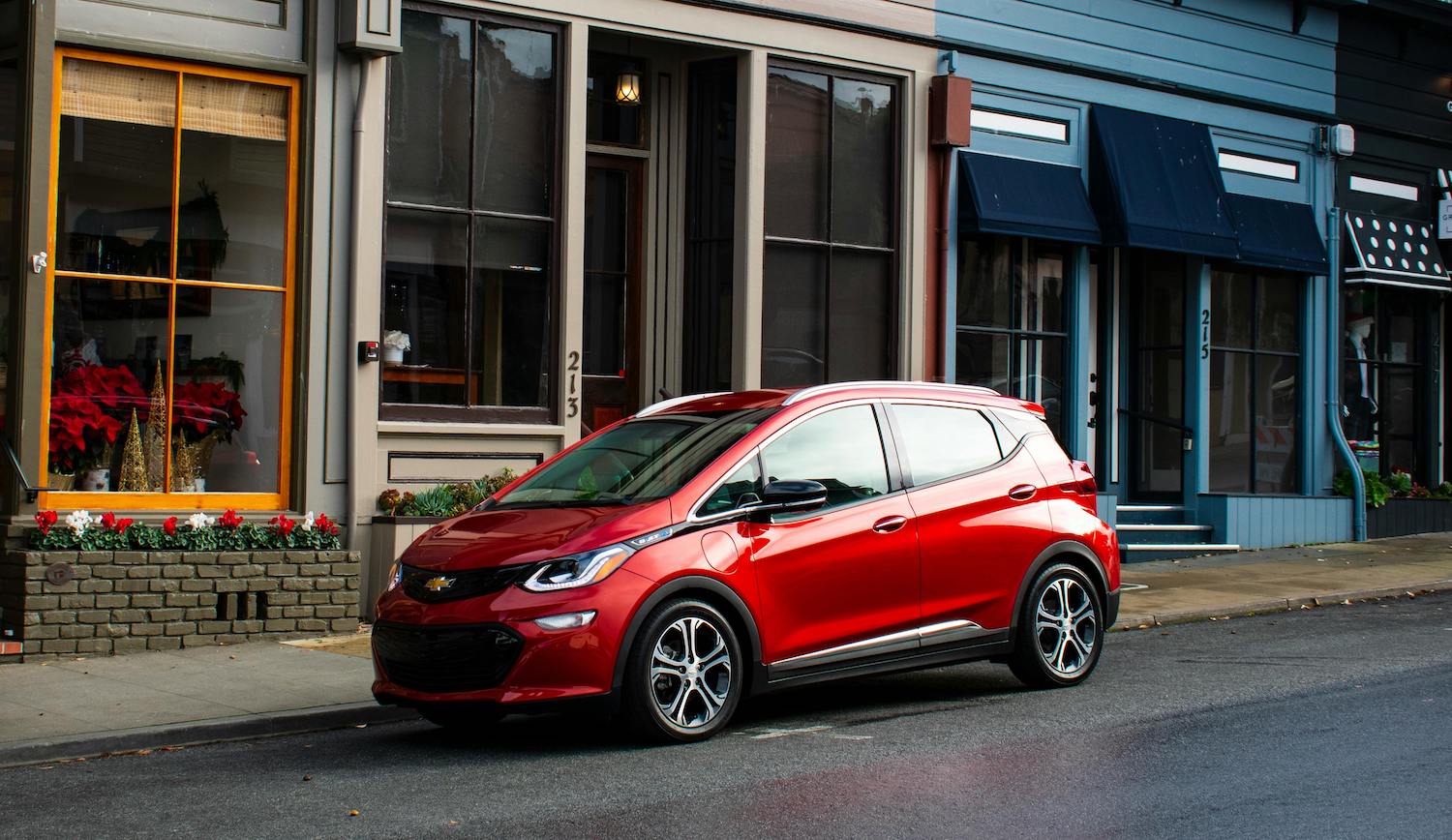Updated 1 year ago
How Much Does it Cost to Charge a Chevy Bolt?
Written by
Jamie Smith

Find out what solar panels cost in your area
With the popularity of electric-powered vehicles on the rise, Tesla isn’t the only major EV name on the market nowadays. Some of the biggest car manufacturers have jumped on the bandwagon, releasing more and more models of electric-powered vehicles to try to become more environmentally friendly and to give drivers a good bang for their buck.
It’s not just about the environment - EVs can help your wallet. Since gas prices are on the higher side, many drivers are opting for EVs as a way to save on fuel costs. One of the most affordable electric options is the Chevrolet Bolt. But many drivers want to know how much it costs to charge a Chevy Bolt and if it’s really cheaper than gas.
Let’s jump into how much it costs to charge a Chevy Bolt at home, at public chargers, and how much EV charging with solar panels can save you.
How much does it cost to charge a Chevy Bolt?
Est. home charging cost* | Est. public charging cost | Est. solar charging cost** | |
|---|---|---|---|
Chevy Bolt EV + EUV | $11.47 | $36 | $4.50 |
Cost per mile Bolt EV | $0.04 per mile | $0.14 per mile | $0.02 per mile |
Cost per mile Bolt EUV | $0.05 per mile | $0.15 per mile | $0.02 per mile |
*Assumes 85% charging efficiency and an average electric rate of $0.15 per kWh
**Assumes 85% charging efficiency
The 2023 Chevy Bolt EV and Bolt EUV models have a 12-volt, 65-kilowatt-hour (kWh) capacity battery. The price you pay to charge your EV battery will vary depending on what kind of charging station you use, electricity costs, and a few other factors.
At-home charging
It will cost an average of $11.47 to charge a Chevy Bolt EV from 0 to 100% at home, assuming a charger efficiency of 85% and an electricity rate of $0.15 per kWh. This works out to about $0.04 per mile of range for the Chevy Bolt EV and $0.05 per mile for the EUV. A traditional gas car, on the other hand, costs about $0.18 per mile!
Remember, the actual cost to charge your Chevy Bolt at home will depend on your utility’s electricity rate and how efficient the charger you’re using is.
As a bonus, Chevy offers coverage to install a (240-volt) outlet for eligible customers who purchase or lease a 2023 Chevy Bolt EV. However, the charging unit is not included. They also offer incentives to offset the cost of installation for non-eligible customers. It’s an easy, cost-efficient way to get your vehicle charged and ready for the daily commute.
Public charging stations
The average public charging station rates range anywhere from $0.31 to $0.69 per kWh. So, you’re spending an average of $20.15 to $44.85 for a full charge at one of these stations. This price will vary from station to station, and it could be higher depending on how efficiently the station charges your car.
Things get a bit more pricey when charging at public charging stations – like the ones you see at rest stops, grocery stores, or the mall. These prices may include some additional charges, like session fees or charging fees. Some even have idling fees to prevent you from leaving your car at the charger after it’s already full!
You probably won’t rely on public charging stations as the primary way to charge your Chevy Bolt. Home chargers are more cost-efficient, but on long drives and road trips, you may need to stop and get a charge.
Installing an at-home charging station will be a more cost-efficient way of charging your Bolt. However, you may need to stop off on long drives and road trips to get a charge.
Charging your car in public can be a lengthy process. Find a DC fast-charging station, as they typically have the fastest charging time. These stations can get you up to 100 miles of range in only 30 minutes! Keep in mind these chargers are powerful and do put stress on your car’s battery, so you shouldn’t rely on DC fast chargers as your primary charging method.
Why you should charge your Chevy Bolt with solar panels
Did you know you could save yourself even more by charging your EV using solar panels? In fact, solar panels and electric-powered cars are a perfect match!
Our 2024 EV report states that charging your EV in good solar states costs about $0.06 per kWh. That means fully charging your Chevy Bolt using home solar panels would only cost about $4.50. That’s just $0.02 per mile of range!
Having solar panels to charge your electric vehicle at home shields you from rising utility costs, so you can charge your car for less over the 25-year lifespan of your solar panels! Plus, charging using solar panels is far less polluting than gasoline or electricity from the grid.
How does the Chevy Bolt compare with other EVs on the market?

With Tesla being such a big name in the electric car market, why choose a Chevy Bolt? For one thing, the Chevy Bolt is one of the few EVs that qualify for the Clean Vehicle Federal Tax Credit. Purchasing a Bolt EV or EUV means you could be eligible for an EV tax credit of up to $7,500.
More importantly – the Chevy Bolt is on the more affordable side of the EV market. Chevy labels the Bolt EV as America’s Most Affordable EV, based on comparison with other competitors – and they’re truly living up to that name. The Bolt EV has a starting MSRP of $26,500, and the EUV starts at $27,800.
According to data from a Kelley Blue Book report, the average price for EVs in 2022 was over $66,000. As you can see, the Bolt is far below the market average.
What are the pros and cons of the Chevy Bolt EV?
After seeing such a low price compared to the market average, you must be thinking – what’s the catch? While we believe the Chevy Bolt EV and EUV are great options, owning one has advantages and disadvantages. The chart below highlights the pros and cons of owning a Chevy Bolt.
Pros
-
Affordable
-
Qualifies for the Clean Vehicle Federal Tax Credit
-
myChevrolet mobile app performance tracking capabilities
Cons
-
Shorter driving range than other EVs
-
Slow charging speed
Overall, the Chevy Bolt is a great, affordable option for the everyday driver. It has plenty of range to get to and from work and run errands, is spacious, and comes at a great price point. Plus, since it’s one of the few vehicles that qualify for the EV tax credit, you can lower the price even further. Customers have also found the mobile app helpful in keeping tabs on charge status, and planning trip routes with charging stops.
However, if you’re going on regular road trips, the range might be a tad limiting for you. Other (more expensive) EVs come with ranges over 300 miles, with some pushing 400. And one of the biggest customer complaints is slow charging speed, even at DC fast chargers, which could add a few hours to your trip.
But, one of the biggest drawbacks is that the Chevy Bolt is being discontinued at the end of 2023. Chevy is replacing it with the electric version of the popular Equinox vehicle. While this EV is still slated to be affordable, it might be a little pricier than the Bolt, and discontinuing the models could make repairs a bit tricky in the future.
Chevy Bolt vs. gas-powered vehicles
The average gas price across the U.S. has been about $3.58 per gallon– with no signs of a significant price drop anytime soon. Using a gas-powered 2023 Chevy Equinox as an example to compare to the 2023 Chevy Bolt EV, you’ll see just how much you can save!
With a 15.6 gallon tank, a 2023 Chevy Equinox will cost about $56 to fill up from empty, compared to the 2023 Chevy Bolt EV and EUV, which will cost you at most around $44.85 at a public station but can reach prices as low as $9.75 from at-home chargers.
With solar, you could potentially fully charge your Chevy Bolt’s battery for less than the cost of one gallon of gas!
If you’re an EV owner or in the market for one, find out if at-home charging using solar panels is a good fit for your household by entering your details into our solar calculator to learn more.
Jamie is a content writer and researcher with a B.S. in Communications from La Salle University, where she focused on journalism, mass media, and public relations. As a former member of the SolarReviews editorial team, she created content to help homeowners better understand solar energy and make informed decisions. Prior to joining SolarReviews, she worked at a marketing company producing long-form stories and interviews that highlighted small ...
Learn more about Jamie Smith